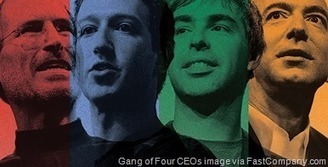Get Started for FREE
Sign up with Facebook Sign up with X
I don't have a Facebook or a X account
 Your new post is loading... Your new post is loading...
 Your new post is loading... Your new post is loading...

Tom Hood's curator insight,
February 22, 2014 10:44 AM
is your next business model a platform? This great blog post captured by curator Robin Good talks about platforms and the gang of four (Amazon, Google, Apple, and Facebook).
"Today’s dizzying pace of change shows no signs of abating. If anything, it is likely to accelerate. So do everything you can to heed these lessons today, to be as prepared as possible for a vastly different tomorrow." The ten lessons identified remind me also of the work of Rita McGrath (End of Competitive Advantage) who talks about six key areas in what she calls "The New Strategy Playbook": 1. Continuous Reconfiguration and also the book, The Power of Pull... |

Robin Good's curator insight,
October 15, 2013 12:58 PM
Jeremiah Owyang, a partner at the Altimeter Group, has published a valuable presentation outlining the key traits characterizing sustainable business models in the near future. The key takeaways include:
Excellent trends analysis. Owyang is right on target with his future of business models identikit. Check the full presentation here: http://www.slideshare.net/jeremiah_owyang/the-future-of-business-models (HT to Giuseppe Mauriello) 
Tom Hood's curator insight,
February 22, 2014 8:24 AM
Great find by Robin Good and timely as we just had a session with Rita McGrath (author of the End of Competitive Advantage) emphasizing the impact of disruption and the need for a different mindset around resilience. This preso by Jeremiah Owyang gives some great tips for thinking about the types of shifts in business models we should be thinking about.
Slide 13 captures these shifts well:
1. Purpose (start with why) is key 2. Glocal wins - Global reach and mindset delivered locally (relationships) 3. Personalize everything possible 4. On-demand 5. People make and share - collaboration and co-creation with your customers 6. Empowered people
This is important for CPAs to understand as they advise and support their businesses (clients and employers). Business models are no longer stagnant or as Rita would say, sustainable over a long-term. Thus we need to be constantly re-examiming our competitive advantages.

Tom Hood's curator insight,
February 22, 2014 10:44 AM
is your next business model a platform? This great blog post captured by curator Robin Good talks about platforms and the gang of four (Amazon, Google, Apple, and Facebook).
"Today’s dizzying pace of change shows no signs of abating. If anything, it is likely to accelerate. So do everything you can to heed these lessons today, to be as prepared as possible for a vastly different tomorrow." The ten lessons identified remind me also of the work of Rita McGrath (End of Competitive Advantage) who talks about six key areas in what she calls "The New Strategy Playbook": 1. Continuous Reconfiguration and also the book, The Power of Pull... |












La curaduría de contenidos como modelo de negocios, por Robin Good.
Mitch Free writes on Forbes about the unique business value that curation can bring to those markets where there is already an abundance of choices.
"The web has revolutionized access to information. If you travel to a new city, you don’t have to wait to ask a hotel concierge or local contact which restaurants are worth your time: that information is at your fingertips long before you arrive.
The web’s universality and ubiquity are also its weaknesses, however: even if all are listed online, choosing from the 25,000 restaurants in New York City still requires a local’s advice.
While “curation” might bring to mind the image of a red-jacketed museum staffer scowling at you for taking flash photographs, in the digital age it’s becoming an increasingly critical – and lucrative – business model.
No longer is access to information precious in itself. Information is overwhelmingly available, and those in a position to tame the tidal wave into a useful format offer a valuable service."
The articles uses as a reference example the case of a new restaurant listing site that curates the best 100 restaurants in 100 cities by charging qualifying restaurants.
Rightful. Interesting. 7/10
Full article:http://www.forbes.com/sites/mitchfree/2013/08/05/curation-by-connection-one-hundred-tables/
Non-Profits are a commodity. There are over 1.5 million of them in the US alone, all with great causes, all with their hands out to ask for money. Enter Donor Fatigue. Want to stand out? Become "the" source of information on your cause. In other words, give to get. You will stand out. You will gain trust. And, you will raise money.